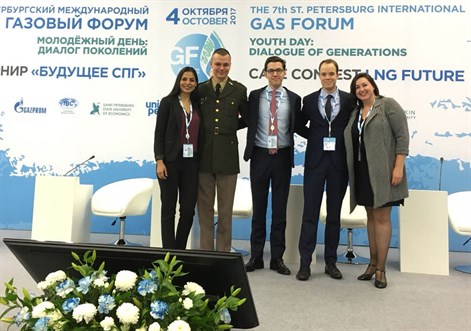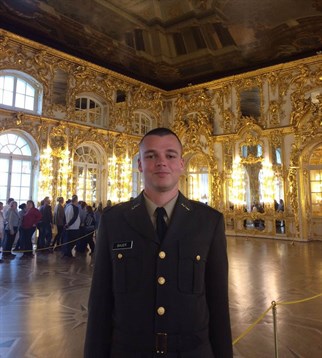 This fall, Julien Bauer, a petroleum engineering master’s student, and his French team members won first place at the International Gas Forum of St. Petersburg competition.
This fall, Julien Bauer, a petroleum engineering master’s student, and his French team members won first place at the International Gas Forum of St. Petersburg competition.
It was a big moment for him, and Bauer was proudly representing Texas A&M University by wearing his Corps uniform throughout the presentation.
“A lot of people didn’t suspect that it was an American uniform, they thought it was a French uniform,” Bauer said. “I explained that it’s not French, it’s from my university in Texas. Some people learned about A&M that way.”
Bauer is completing a dual degree with Texas A&M and the French Petroleum Institute. The two schools have developed a program together that creates a unique opportunity for students like Bauer. He spent last fall at Texas A&M, his spring and summer semesters studying in France, and is now back at Texas A&M for two semesters.
Attracted at first to the partnership program, Bauer dove into research about Texas A&M to decide if it was the right school and program for him.
“This partnership is something that caught my attention when I researched A&M on the internet,” Bauer said. “Being an international student, I hadn’t heard about A&M before so I spent quite a bit of time on the website. To be honest, I looked also at the rankings. I saw that A&M has a very good engineering program, especially petroleum engineering.”
Being in the Corps this semester has shown Bauer even more of Texas A&M’s traditions, which is something he enjoys about the university.

“It’s rooted in tradition,” Bauer said. “There are a lot of traditions here, and I didn’t expect that coming from France. Right now I am in the Corps and I see all of these traditions like Muster and the different yells. All of these things are really interesting to me.”
Bauer does not even have a traditional undergraduate degree. Instead, he already has a master’s degree from MINES ParisTech. In France, he studied for two years in preparation math and science courses, then applied to many schools to complete his graduate engineering degree.
When Bauer was in France, he learned about the International Gas Forum of St. Petersburg, Russia. He decided to apply for the French team because there were not enough applicants to create an American team.
Bauer applied with a cover letter, resume´ and case study related to a liquefied natural gas strategy of a company. Based on this, five students were selected for each team. Bauer was the only engineering student chosen on his team, which consisted of several political science students and a business student. He believes this played a part in their success.
“I was the only engineering student. I think that gave us strength because we had all these different approaches,” he said. “I could understand the technical part, and the guys from the business school could understand the economics, and the guys from politics were more into the strategies. We were quite complementary and that is what I believe made the presentation good.”
Judges evaluated teams on their presentation about the global energy strategy of a gas company. Bauer’s team chose Shell, and they had 10 minutes to present no more than 10 slides. Next, they were asked questions by the jury and were judged by their responses.
The team then awaited the results with excitement and anxiety, as the Russian team had won the two previous years. When the judge announced the French team won, they were elated.
In addition to the honor of winning the competition, Bauer and his team won an all-expenses paid, two-week trip to Europe and Russia.
“It’s a really great opportunity,” Bauer said. “Of course petroleum engineering students can apply, but it is not just limited to students in engineering. I hope more U.S. representatives apply next year and compete.”